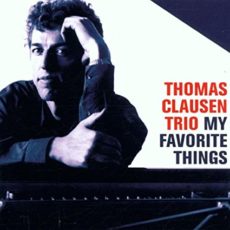
Daily Dose Of Jazz…
Thomas Clausen was born on October 5, 1949 in Copenhagen, Denmark and grew up in a musical home with his father playing a strong and able jazz piano in swing style, his mother from a family of singers. He began playing very young with great artists of jazz and his energetic and lyrical piano playing was discovered by Dexter Gordon in 196. During that same year he joined Palle Mikkelborg’s projects and groups and was soon playing regularly with the bass players Niels-Henning Orsted Pedersen, Bo Stief, and Mads Vinding, as well as with the drummers Alex Riel, Bjarne Rostvold, and Kasper Winding.
Accompanying a number of international jazz stars visiting Copenhagen, Thomas has performed with Ben Webster, Elvin Jones, Jan Garbarek, Joe Henderson, Phil Woods, Lee Konitz, Stan Getz, Chet Baker, Eddie ”Lockjaw” Davis, Jackie Mclean, Gary Bartz, and Johnny Griffin, just to mention a few. In the mid 80’s he was a regular member of the Peter Herboltzheimer International Big Band in Germany.
Clausen formed his own band in 1978, when he started Mirror, a group that recorded the first LP with his own compositions and included Jan zum Vohrde on saxophone and flute, bassist Ole Skipper Moesgaard, and Aage Tanggaard on drums. 1979 saw him leading his first jazz trio, with bassist Niels-Henning Orsted Pedersen and once again Tanggaard on drums, releasing two albums by 1983. Towards the end of the decade another trio emerged with Mads Vinding and Alex Riel and participated in the first Jazzpar Prize concerts in Copenhagen, Odense, and Paris in 1990, joined by with Gary Burton. The collaboration with Burton lasted a couple of years and led to two recording sessions.
Through the Nineties he delved into Brazilian music, recording and performing with many who were living in Denmark and Germany. His Brazilian Quintet continued into the new millennium, performing and touring throughout Europe. At 67, pianist, composer, arranger and bandleader Thomas Clausen has received the Ben Webster Prize, The Jasa Prize, The Fanfare Prize, and The Danish Society for Jazz, Rock and Folk Composers Prize, received support from the Danish Arts Foundation for fifteen consecutive years from 1993 to 2007 and continues to compose, perform as a leader and co-leader and to tour.
More Posts: piano
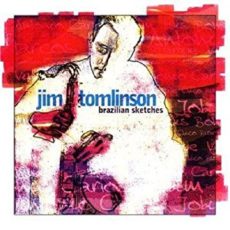
Daily Dose Of Jazz…
Jim Tomlinson was born September 9, 1966, in Sutton Coldfield, Warwickshire, England. He grew up in Northumberland and did not study music formally until well into his 20s. He played saxophone and ran a band as a hobby whilst studying for his degree he attended Oxford University where he studied philosophy, politics and economics while playing clarinet and saxophones, mostly the tenor, and developing his interest in jazz.
As a postgrad at London’s Guildhall School of Music and Drama he establish himself on the local jazz scene. With his reputation quickly spreading he was soon working with noted musicians Matt Wates, David Newton and Michael Garrick, recording with the latter on his 1997 session For Love Of Duke And Ronnie.
In the 90s he led his own quartet, touring the UK extensively in the UK and was often in the musical company of singer Stacey Kent. They married in 1991 and he appeared on her albums for Candid Records. Singed to Candid also, Jim released his debut album as leader, Only Trust Your Heart in 2000 giving him not only a UK but and international audience as well. This was followed by his sophomore project in 2003 titled Brazilian Sketches in 2003.
Tomlinson has gone on to work in a wide variety of groups, from Brian Ferry to experimental big band composer, Michael Garrick to leading and touring with his own quartet.
Tenor saxophonist Jim Tomlinson has released three albums, has been nominated for a Grammy and continues to compose, record and perform.
More Posts: saxophone
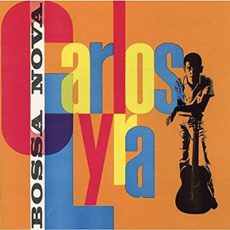
Daily Dose Of Jazz…
Carlos Lyra was born on May 11, 1939 in Botafogo, Rio de Janeiro, Brazil. His first song to be recorded was Menina (Girl) in 1954, released as a single by Sylvia Telles in 1955, with Foi a noite (It Was The Night)by Antonio Carlos Jobim on the other side of the record. The composers met for the first time because of this single, when Jobim called Lyra, the other side of the record. Both were composing their own music and writing lyrics and created a colloquial and completely new style. Writing about their own experiences and feelings was a completely different lyrical style from most songs written at that time.
His first compositions from 1954 to 1956 included Quando chegares (When you Arrive), Barquinho de Papel (Paper Boat), Ciúme (Jealuosy), Criticando (Criticizing) and Maria Ninguém (Maria Nobody). By 1957 Carlos began collaborating with the lyricist Ronaldo Bôscoli, songs such as Lobo bobo, Saudade fez um samba (Saudade Made A Samba) and Se é tarde me perdoa (If it’s Late Forgive Me).
In 1958 wrote Aruanda and Quem quiser encontrar o amor (Whoever Want To Find Love), with Geraldo Vandré. In 1960 he started to compose together with Vinicius de Moraes, songs as Você e eu (You And Me), Coisa mais linda (Most Beautiful Thing), Sabe você? (Do You Know), Samba do Carioca (Samba From Rio), Maria Moita (Maria Bush) and many others. They wrote together a musical play in 1962 called Pobre Menina Rica (Poor Little Rich Girl Blue).
In 1959 Carlos and Antonio Carlos Jobim, were the first two music composers, together with lyricists Vinicius de Moraes and Ronaldo Boscoli, to be recorded by João Gilberto on his first LP titled Chega de Saudade, (Enough Of Saudade) which was called the first generation of Bossa Nova.
1961 saw Lyra as one of the five founders of Center of Popular Culture aka CPC, where he started to write songs for cinema and theater. He also wrote the song Influência do Jazz (Influence Of Jazz), one of the songs he sang at the Bossa Nova Concert at Carnegie Hall in 1962.
Composer, lyricist, guitarist and vocalist Carlos Lyra, who penned many bossa nova and Música popular brasileira classics, continues to compose, record, and perform today.
Sponsored By
#preserving genius
More Posts: guitar
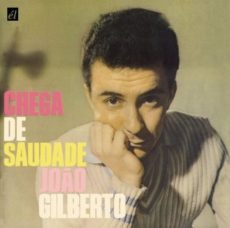
Daily Dose Of Jazz…
João Gilberto Prado Pereira de Oliveira was born on June 10, 1931 in Juazeiro, Bahia, Brazil. From an early age, music was a part of his life with his grandfather buying him his first guitar at the age of 14. During high school he teamed up with some of his classmates to form a small band and was influenced by Brazilian popular songs, American jazz, and even some opera, among other genres. After trying his luck as a radio singer in Salvador, Bahia he was recruited in 1950 as lead singer of the vocal quintet Garotos da Lua (Moon Boys) and moved to Rio de Janeiro. A year and a half later, he was dismissed from the group for his lack of discipline, showing up late to rehearsals or not at all.
João Gilberto’s first recordings were released in Brazil as two-song 78-rpm singles between 1951 and 1959. In the 1960s, Brazilian singles evolved to the “double compact” format, and João would release some EPs in this new format, which carried 4 songs on a 45-rpm record. For seven years, Gilberto’s career was at a low ebb. He rarely had any work, was dependent on his friends for living quarters, and fell into chronic depression. Eventually, in 1955 he was rescued from this rut by Luiz Telles, leader of the vocal group Quitandinha Serenaders, where he blossomed musically. His first bossa nova song was Bim-Bom, written as Gilberto watched passing laundresses on the banks of the Sao Francisco River balance loads of clothes on their heads.
This style, which Gilberto introduced in 1957, created a sensation in the musical circles of Rio’s Zona Sul, and many young guitarists sought to imitate it. It was first heard on record in 1958 in a recording of Chega de Saudade, a song by Jobim and Vinicius de Morais. With this success launching his career and the bossa nova craze, João featured new songs by a younger generation of performer/composers such as Carlos Lyra and Roberto Menescal on two more albums. By 1962, bossa nova had been embraced by North American jazz musicians such as Herbie Mann, Charlie Byrd, and Stan Getz, who invited Gilberto and Jobim to collaborate on what became one of the best-selling jazz albums of all time, Getz/Gilberto. Through this album, Gilberto’s then wife Astrud—who had never sung professionally prior to this recording session became an international star, and the Jobim/de Moraes composition The Girl from Ipanema became a worldwide pop music standard.
Gilberto went on to work with Claus Ogerman, Clare Fischer, Caetano Veloso, Gilberto Gil and Maria Bethânia among other collaborations. He won a Grammy Award for Best World Music Album in 2000 for his album João Voz E Violão. Singer, guitarist and composer João Gilberto continued to perform, record and composer until declining health and financial issues took their toll and on July 6, 2019 he transitioned at his apartment in Rio de Janeiro, Brazil. He was 88.
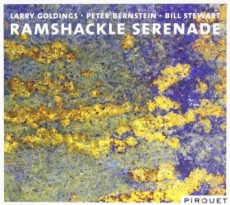
Daily Dose Of Jazz…
Larry Goldings was born August 28, 1968 in Boston, Massachusetts and studied classical piano until the age of twelve. While in high school at Concord Academy his primary influences were Erroll Garner, Oscar Peterson, Dave McKenna, Red Garland and Bill Evans. As a young teenager, Larry studied privately with Ran Blake and Keith Jarrett.
Goldings moved to New York in 1986 to attend a newly formed jazz program under the leadership of Arnie Lawrence at The New School. During college he studied piano with Jaki Byard and Fred Hersch. While still a freshman, Sir Roland Hanna invited him to accompany him to a three-day private jazz party in Copenhagen. While there, he met Sarah Vaughan, Kenny Biurrell, Tommy Flanagan and Hank Jones and had the opportunity to play in the band with Vaughan, Harry Sweets Edison and Al Cohn.
As a college student, Larry embarked on a worldwide tour with Jon Hendricks, working with him for a year. A collaboration lasting almost three years with guitarist Jim Hall followed. By 1988 he began developing his organ chops and secured a regular gig at Augie’s Jazz Bar, now Smoke on Manhattan’s Upper West Side. He was featured with several bands, and his own trio with guitarist Peter Bernstein and drummer Bill Stewart got its start there.
His first release was Intimacy Of The Blues in 1991 followed by sixteen more albums as a leader and has appeared as a sideman on hundreds of recordings. Over the course of his career, Goldings distinctive keyboard sound has been sought out more and more by pop, R&B, Brazilian, and alternative artists, such as, Madeleine Peyroux, John Scofield, Carla Bley, Michael Brecker, De La Soul, India Arie, Tracy Chapman, Pat Metheny, Dave Grusin, Norah Jones, John Mayer, Sia, John Pizzarelli, Steve Gadd, Rickie Lee Jones, Jack DeJohnette, Luciana Souza, and the list goes on and on.
In 2007, Larry, DeJohnnette and Scofield captured a Grammy nomination for Best Jazz Instrumental Album Individual or Group for their live album, Trio Beyond – Saudades. He has been twice awarded Best Organist/Keyboardist of the Year by the Jazz Journalists Association, and twice Best Jazz Album for Awareness and Big Stuff by the New Yorker Magazine.
As a composer his music has been used in the films Space Cowboys, Proof and Funny People. Brecker, Scofield, DeJohnette, Hall, Sia, Toots Thielemans, Curtis Stigers, James Taylor and Jane Monheit among others have recorded his compositions. Organist and keyboardist Larry Goldings continues to perform, record, tour and compose.
Selected discography[edit]
More Posts: organ





